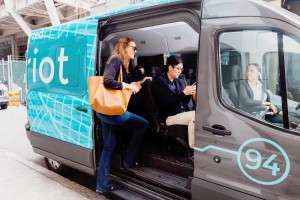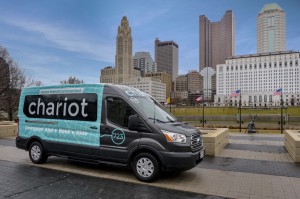
Chariot will run its 14-passenger, WiFi-enabled and air conditioned vehicles on four routes in London: Chariot's first foray into Europe.
While rivals including General Motors and Waymo are hoping to launch driverless ride-sharing services next year, Ford is moving in a slightly different direction with its own mobility services campaign, and it is ramping up the expansion of its Chariot minibus service.
The venture, which largely focuses on connecting transportation hubs and other public facilities, already operates in five U.S. cities. This week, Ford is adding London and planning to add a sixth U.S. city “very shortly.”
“Chariot’s commuter ride-share service will complement the existing public transport system by offering in-app ride booking for first- and last-mile commuting solutions, and the potential to reach underserved areas,” the automaker said in a statement.
Under former CEO Mark Fields, Ford declared its intent to become a “mobility company,” rather than a conventional automaker. That has involved a variety of experimental programs and tie-ups with a range of partners as far afield as Amazon, which now allows Ford customers with the latest version of its Sync 3 infotainment system to access the Alexa voice assistant.
Ford also is working on autonomous and fully driverless vehicle development. Last autumn it partnered with Domino’s to test consumer reaction to having pizzas delivered without a driver. The second-largest of the Detroit automakers says it plans to have fully driverless vehicles in production by 2022, targeting both delivery and ride-sharing services like Lyft, which it is also partnering with.

Automakers will spend billions in the near future on mobility ventures, like Ford's Chariot shuttle service.
(Ford puts structure to its mobility plan. Click Here for the story.)
But some of Ford’s mobility ventures hope to be well established by then, even if they rely on human drivers, as is the case with Chariot.
Already operating in New York, San Francisco, Seattle and three other U.S. markets, Chariot allows passengers to pre-book seats on its minibuses which service transportation hubs, as well as park-and-ride facilities. It essentially provides “last mile” transportation, filling in the gaps left by existing services.
With the addition of London, Chariot moves into Europe for the first time, and has been authorized to operate on three routes for the next year, while a fourth will be tested for nine months. Long-term approval could follow.
(Click Here for more about Ford CEO Hackett’s vision of the future.)
“This service has the potential to provide useful transport links in the areas they will serve, largely outside central London, and we will carefully monitor this trial,” said a spokesman at Transport for London, or TfL, which regulates service providers like Chariot.
Approval comes at the same time ride-sharing giant Uber has been fighting to win back authorization to operate in the British capital. It was revoked late last year due to a series of scandals that have plagued the company and led to the ouster of founder and CEO Travis Kalanick.
Ford, like GM and other automakers, sees ride-sharing and other mobility services as both an opportunity and a threat. A recently released study by the Boston Consulting Group warned that automakers could become little more than commodity providers in the decades ahead if they cede dominance to the likes of Uber, Lyft and other new entrants. A separate study by Navigant Research estimated that ride-hailing services – which would include Chariot – could generate as much as $1.2 trillion in annual global revenues by 2026.
(To see more about Hackett’s insistence on ‘no dumb cars’ in the future, Click Here.)
The other cities where Chariot now operates are Columbus and Austin. Ford’s global president of mobility Marcy Klevorn declined to say where the sixth U.S. market will be based but told the Reuters news service it will launch “very shortly.”

